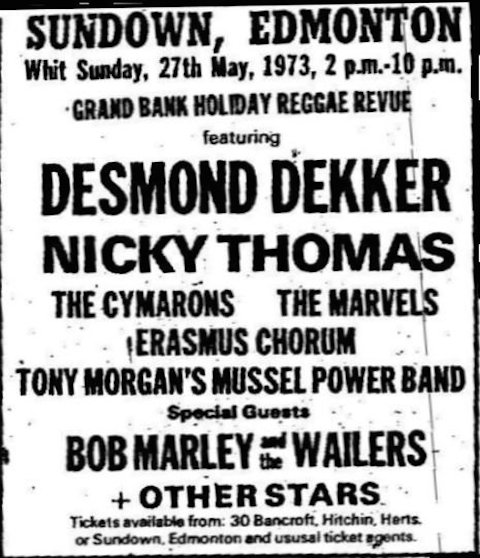If you’ve spent any time at all on a college campus, you’ve heard Bob Marley and the Wailer’s 1984 compilation album Legend wafting from dorm rooms and frat house windows. The longest charting album in the history of Billboard magazine, it contains all of the band’s top 40 hits and more or less stands as every young American’s introduction to the iconic Jamaican singer, if not to reggae music itself. Before Legend, there was Eric Clapton’s cover of Marley’s 1973 single “I Shot the Sheriff.” Clapton’s version hit number one on the Billboard Hot 100 in ’74—his only number one hit in the U.S.—and introduced American audiences to Marley’s fiery politics, if not always to Marley himself. On what would have been Marley’s 70th birthday, we bring you some early footage of the man and his band.

While many Americans may been rather late to the Bob Marley party, and to reggae, the English have long had a fascination with West Indian music. Ska pioneers like Desmond Dekker drew huge crowds in the UK while remaining much less popular stateside (though Dekker had a number one hit in the U.S. in 1969). But even some Brits didn’t quite know what to do with Marley when he and the Wailers hit English shores in the spring of 1973. Playing the Sundown Theater in the London suburb of Edmonton in support of Dekker and a host of other acts (top), Marley, writes Dangerous Minds, “was still somewhat of an enigma and the Wailers were sonically much more adventurous than some of the other acts on the bill that day…. According to reports at the time, most of the audience at this Wailers gig didn’t ‘get’ the group.”
Nevertheless, that ’73 tour changed the band’s fortunes forever. After three albums, a previous UK tour, and several attempts to break into the pop charts, the Wailer’s fourth record, major label-debut Catch a Fire, finally made them international stars, if not yet every American college freshman’s favorite band. Just above, hear an FM broadcast of another date from the UK leg of the Catch a Fire tour (see the Youtube page for the full setlist). After Britain, the band played a run of shows at Paul’s Mall in Boston, then four nights at New York’s Max’s Kansas City. Just a few months later, they hit major cities all over the U.S. before returning to England in November in support of Burnin’, and the song Clapton made famous.
While we tend to associate Marley with peace, love, and patchouli—an impression furthered by Legend, which leans rather heavily on the love songs—these early albums are fierce and militant, and do not hold back from explicit calls for violent revolution and condemnation of historical oppression. It’s a somewhat neglected side of Marley’s legend, but in these concerts, we see just how multifaceted a songwriter and performer he was. Charismatic and vibrant, and flanked by the talented Peter Tosh, Marley exudes star power. Today on his 70th birthday, it’s still as good a time as any to celebrate his life and remember his strident yet soulful calls for love and justice.
Related Content:
Video: The Day Bob Marley Played a Big Soccer Match in Brazil, 1980
Johnny Cash & Joe Strummer Sing Bob Marley’s “Redemption Song” (2002)
Bill Graham’s Concert Vault: From Miles Davis to Bob Marley
Josh Jones is a writer and musician based in Durham, NC. Follow him at @jdmagness


Leave a Reply